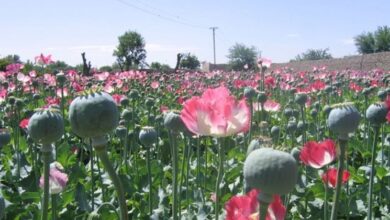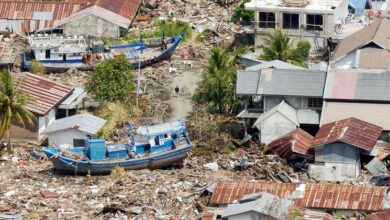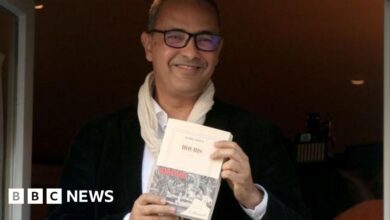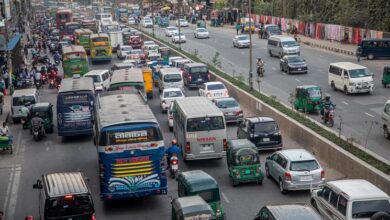Chaos and destruction as Israel strikes deep into the Lebanon Valley
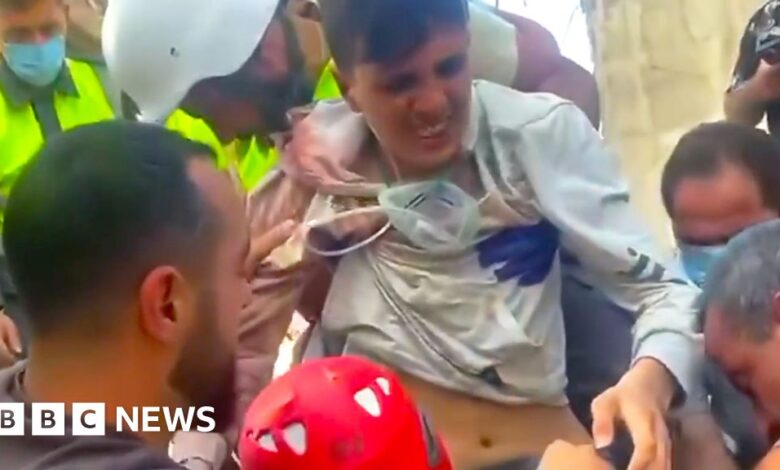
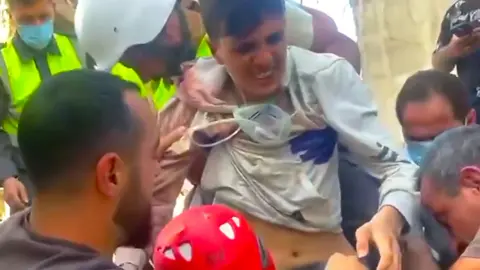 Darren Conway/BBC
Darren Conway/BBCAmbulance driver Samir El Chekieh drives with sirens blaring ahead of the latest Israeli airstrike in El Karak in the Bekaa Valley, eastern Lebanon.
The 32-year-old firefighter and paramedic of the Lebanese Civil Defense Force (CDF) only got a few hours of sleep last night. It was now noon and he still hadn’t had breakfast.
Since the war between Israel and Shia Muslim Hezbollah escalated, the men and women of the CDF have had little rest and are mentally prepared for mass casualties every day.
This article contains graphic descriptions
It was completely different from the last war with Israel in 2006. “We didn’t have those kinds of air strikes,” Samir said. Recently, a fire station was attacked, a church in the south and our humanitarian colleagues were killed.”
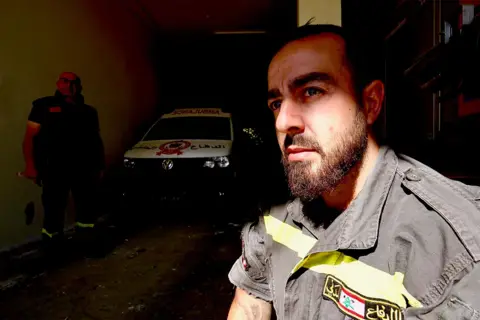 Darren Conway/BBC
Darren Conway/BBCCDF personnel said civilians, including women and children, were increasingly killed and injured as they attended a call-out.
The war between Israel and Hezbollah is spreading across Lebanon.
An intense bombing campaign has expanded beyond the country’s southern border villages and the capital Beirut, to towns in the fertile Bekaa and the historic city of Baalbek, mainly Shia areas , where Hezbollah was founded. The port cities of Sidon and Tire also saw increased attacks.
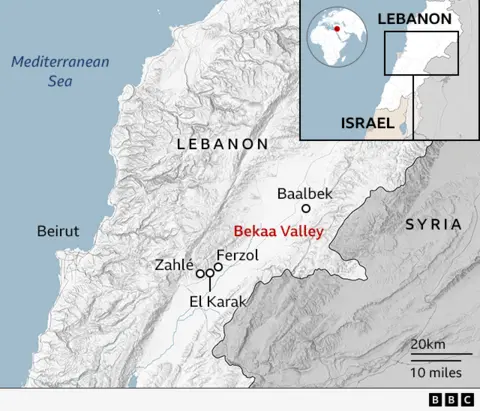
Israel says it only targets Hezbollah fighters, weapons and infrastructure. Since the campaign against the militant group escalated, Israel estimates it has destroyed two-thirds of Hezbollah’s rocket and missile arsenal.
But Hezbollah still fires rockets daily toward Israel.
The BBC spent two weeks with Civil Defense forces in the Bekaa Valley, which stretches east to the border with Syria. Hezbollah’s permission is required to visit the scenes of Israeli attacks.
At that time, the number and frequency of strikes in the region increased significantly.
According to official figures, on October 28, there were more than 100 Israeli attacks and in the past week alone 160 people were killed in the Bekaa. The Lebanese government does not distinguish between fighters and civilians in its figures.
Samir and his men arrived at the Shia village of El Karak to find chaos and destruction – the air was thick with smoke and dust.
Earlier at the station in the nearby city of Zahle, they heard a powerful explosion and from the balcony they saw a cloud of smoke in the distance. They jumped on fire trucks and ambulances and went straight there.
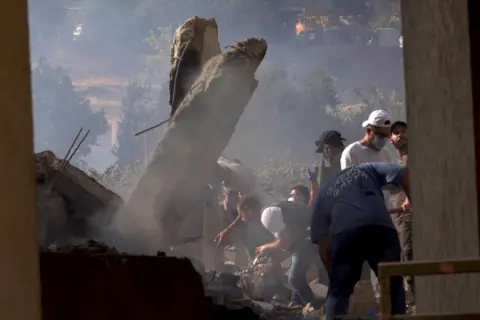 Darren Conway/BBC
Darren Conway/BBCA woman dressed in a chador sat on the sidewalk begging to be let into the smoking ruins of an apartment complex, but men persuaded her to stay. It’s too dangerous, a second Israeli air strike may be about to take place.
The first body they found was that of a man, blown to the ground by the explosion.
There were survivors beneath the collapsed floors of the apartments and Samir was deep in the rubble. He wasn’t wearing protective plastic gloves because the fire was still burning inside, so when he found a child, he could feel the broken bones under his fingertips. When he carefully picked up the child, he realized it was only half its body.
“The first victim I found was a child. I don’t know if it’s a girl or a boy,” he told me later. “Sorry to have to explain that. But from the belly up – from the belly down there’s nothing.”
Previously, the CDF team had received phone calls asking them to evacuate the location they were attending. They claim they come from the Israelites. There were no such calls on this day, so for an hour Samir and the others dug deeper into the rubble.
Finally they found a 10-year-old girl alive. She told rescuers that her 8-month-old brother, Mohammed, was by her side.
“Then we started hearing the screams of a small child,” Samir said.
Through a small gap in the rubble, they discovered the trapped boy, struggling to move his legs, his toddler and a single blue sock that rescuers could see. They carefully removed the debris around him and he was gently cradled in Samir’s arms and carried to safety. His family said Mohammed is currently being treated in Iraq for a head injury.
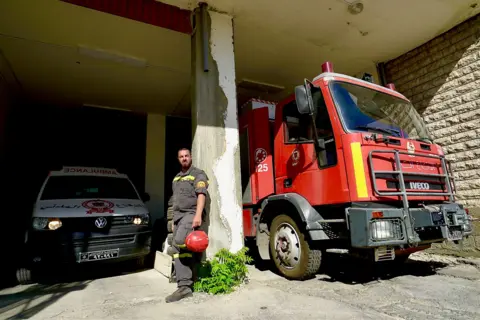 Darren Conway/BBC
Darren Conway/BBCThe CDF operates across Lebanon’s sectarian divide. Samir, a Christian and head of operations at the station in Zahle – a predominantly Catholic town notable for its statue of the Virgin Mary, 54 meters above the hilltop, said know that does not discriminate.
“We do not ask the victim’s gender. We didn’t ask if he was black or white. We did not ask if he was a Christian or a Muslim. We are humanitarians,” Samir said.
The United Nations estimates that every day in October, at least one child was killed and 10 people were injured in Israeli attacks. Those losses, combined with those of their colleagues killed in the strikes, are taking a heavy toll on Samir and his men.
Nearly 24 hours after they left the El Karak site, a second Israeli strike knocked out the remains of the apartment building.
In the early evening, Hezbollah was still firing rockets from a nearby hillside, targeting Israel. A barrage of at least six projectiles caused a forest fire near Zahle.
In the town of Khodor, a Hezbollah flag was planted on the rubble of one of the many buildings flattened by Israeli bombs. Children’s toys have been arranged at the base. A large red Shia flag fluttered in the wind nearby – it was almost the only sound in the largely abandoned town.
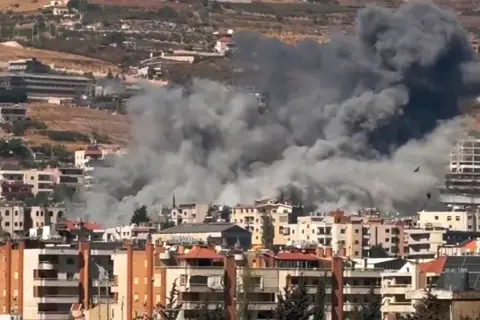
With his head bandaged, Jawad Hamzeh took me through the ruins of his house.
Three of his daughters died in the attack, including 24-year-old pregnant Nada. He held another daughter’s law book, she was studying to be a lawyer.
He says there are no warriors here. “Where are the missiles, have you seen them?” he asked.
Iran-backed Hezbollah began attacking Israel on October 8, 2023 in solidarity with its ally Hamas, which had carried out a devastating attack on Israel the day before. Months of cross-border exchanges followed, and then, in late September this year, Israel assassinated Hezbollah leader Hassan Nassrallah, followed by a ground attack.
Hezbollah is committed to Israel’s destruction, but it is more than a militant group. It is the most powerful political force in Lebanon and a social movement that serves as a bulwark for Lebanon’s long-discriminated Shia communities against other sects in the country.
Tens of thousands of Israelis have been displaced by the years-long war. By attacking Hezbollah on multiple fronts, Israel hopes to weaken the group and let its people return home.
Despite US-led ceasefire negotiations, neither side appears willing to back down.
On October 30, the Israeli military issued an evacuation order in the Baalbek city of Bekaa, in what the United Nations described as “the largest forced displacement Lebanon has experienced in a single day” since start conflict. About 150,000 people had just a few hours to flee another Israeli attack.
There, not far from the magnificent Roman ruins with the towering temple of Bacchus, I met Hussein Nassereldine, 42, whose home had been destroyed in an Israeli attack the night before.
“There are no terrorists or bad people living here,” he said. “All the people who live here are nice people.” He said it was home to families who fled Beirut in 1982 during the country’s civil war, including his own. “We were born here and live here, we will stay and we will not leave here,” he said.
When I left, men with picks and shovels were moving slowly through the rubble and Hussein was preparing to pitch a tent over the remains of the house.
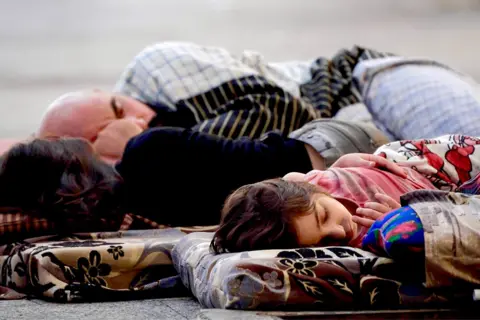 Darren Conway/BBC
Darren Conway/BBCOutside the city, at Dar Al Amal hospital, the injured are recovering from Baalbek’s deadliest day. The local governor said that of the 63 people killed, two-thirds were women and children. Israel said it attacked 110 targets linked to Hezbollah.
In the empty room there was only screaming, the small hand of three-year-old Selin reached out to comfort her. But there was no one there. She suffered burns to her face, broken bones in her legs and injuries to her groin and side. Her mother, father, two sisters and brother were all killed in an Israeli air strike, leaving her heartbroken and alone.
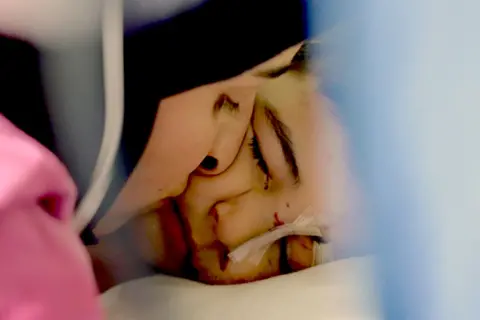 Darren Conway/BBC
Darren Conway/BBCAcross the hallway in the intensive care unit, two-year-old Kayan Smeha suffered a fractured skull. His mother, Najat, 24, gently kissed him on the cheek and hugged him to comfort him.
“He’s still scared,” she told me. “And maybe he was reenacting the scene like I was doing. I can handle it, but he’s young so I can’t.”
Tears rolled down her cheeks but she still refused.
“I cried because I was afraid for my child. But if they think they can defeat us, they are wrong. If I have to, I will sacrifice my son, my husband, my father, my mother, my sister,” Najat said.
“Although the death of a loved one is difficult, it is not as difficult as being humiliated. And we will hold fast to our faith and traditions until death.”
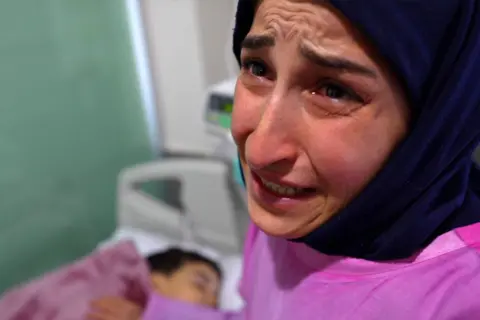 Darren Conway/BBC
Darren Conway/BBCAt the small CDF station in the village of Ferzoul, between orchards and vineyards, the Sun rises after a cold night. Seasonal temperatures here are dropping and most shelters in Lebanon for displaced people are full.
Samir arrived and I asked him how to cope with what he had seen.
“Some images are still imprinted in our heads,” he said, adding that they will never go away.
He relies heavily on his faith.
“When you try to keep one [person] alive, that will give you the strength to continue,” he said.
“And this is the power given by God and we will still do our work. Even when we are directly targeted, we say in Lebanon that God will keep us safe and we have faith in God and He will keep us safe.


